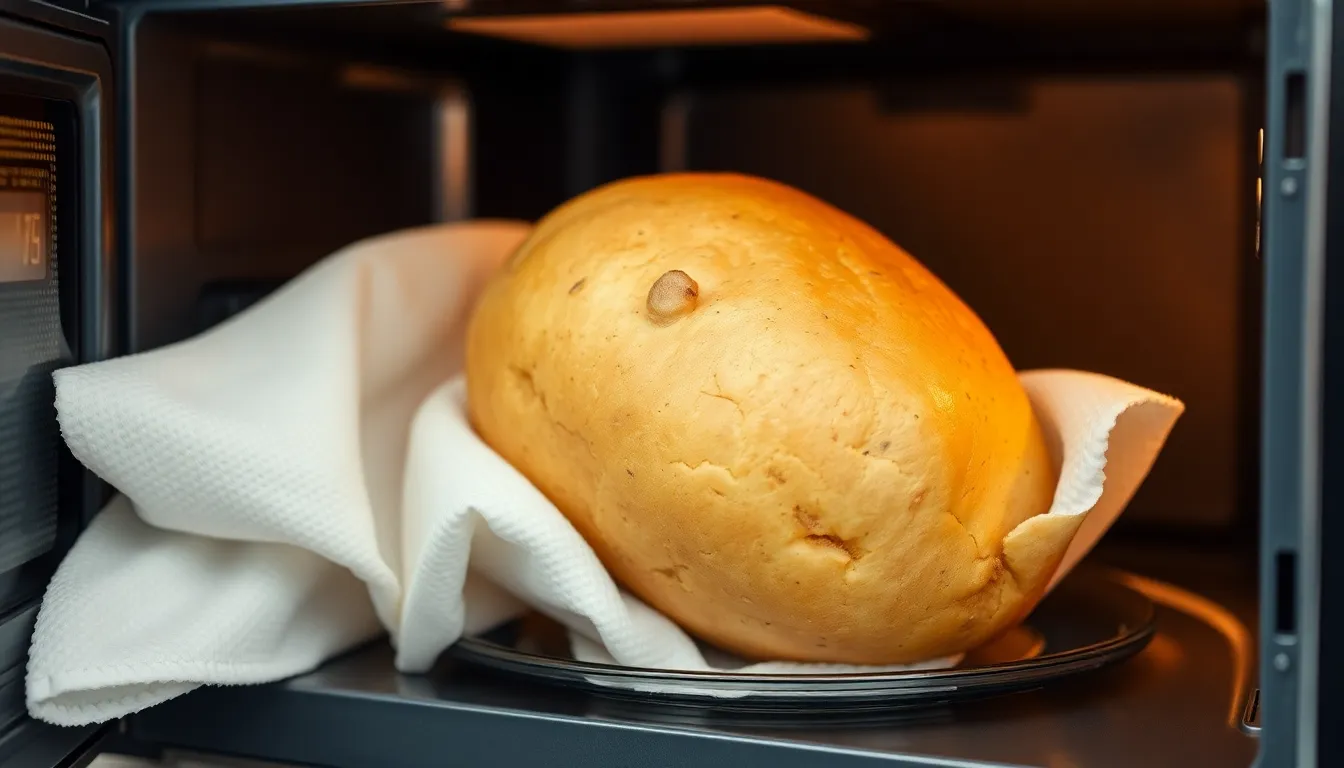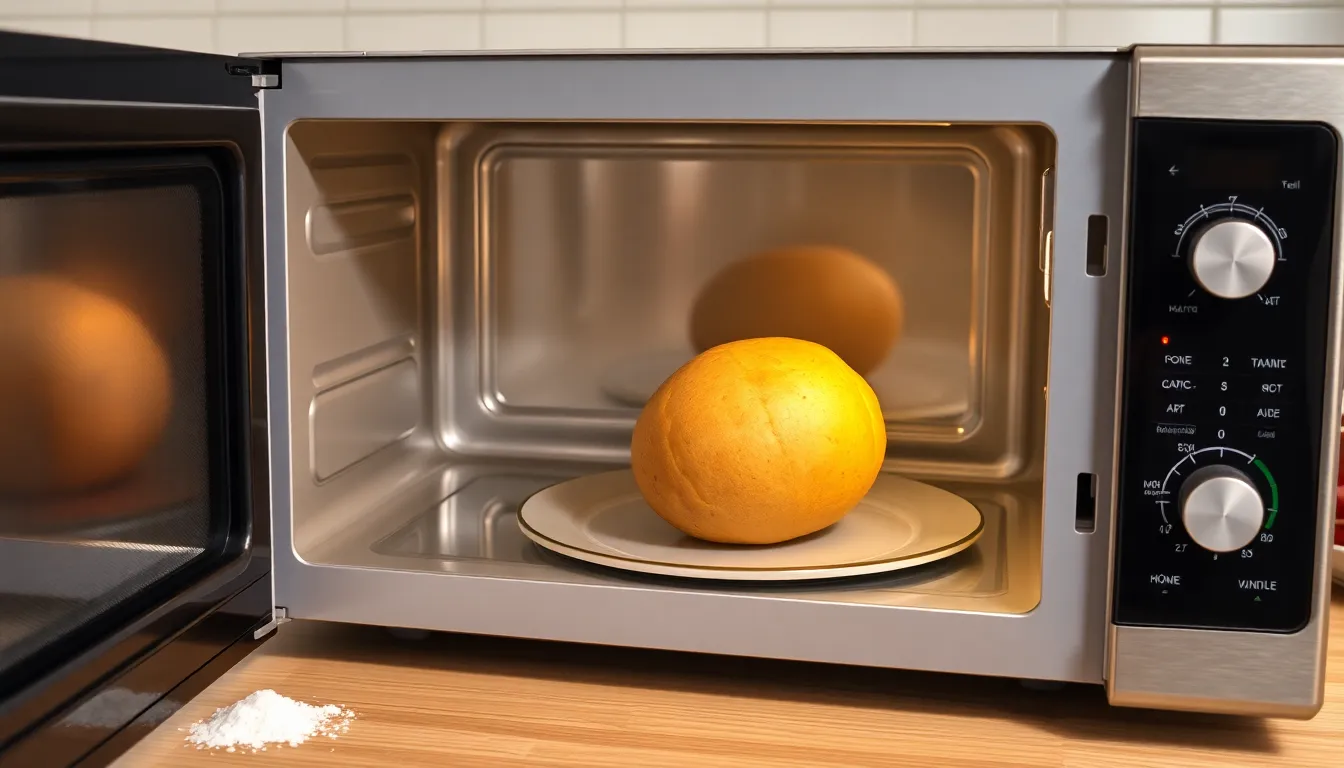Table of Contents
ToggleMicrowaving a potato might sound simple, but getting it just right is an art. Too little time and you’re left with a rock-hard spud; too much, and you’ve got a potato explosion waiting to happen. Who knew that mastering the microwave could feel like preparing for a culinary showdown?
Understanding Microwave Cooking
Microwave cooking simplifies food preparation while decreasing cooking time. When it comes to potatoes, microwaving retains nutrients effectively, making it a popular choice.
Benefits Of Microwaving Potatoes
Microwaving potatoes offers several advantages. First, it reduces cooking time to about 5 to 10 minutes, compared to 40 to 60 minutes using traditional baking methods. Second, it keeps moisture intact, resulting in tender, fluffy textures. Nutritional benefits also increase, as microwaving preserves vitamins that can be lost through extended cooking times. Additionally, energy consumption decreases significantly, making it an environmentally friendly option.
Microwave vs. Traditional Cooking
Comparing microwave and traditional cooking reveals distinct differences. Traditional cooking methods, such as baking or boiling, often require more time and energy. The optimal cooking time for a potato can be up to an hour in an oven. In contrast, microwaving takes a mere fraction of that time. Moreover, uneven cooking often occurs in traditional methods, while microwaved potatoes typically cook uniformly. When considering convenience and efficiency, microwaving emerges as a superior choice for busy individuals.
How Long Should I Microwave A Potato?

Cooking a potato in the microwave involves specific times to achieve optimal results. Mastering these times leads to perfectly cooked potatoes without the risk of bursting.
Factors Affecting Cooking Time
Potato size plays a crucial role in determining cooking time. A medium potato typically takes around 5 to 7 minutes, while a larger potato may require up to 10 minutes. Additionally, the microwave’s wattage influences cooking duration. Higher wattage microwaves cook potatoes faster, decreasing time by 1 to 2 minutes. Potato variety also matters; starchy types, like Russets, cook differently compared to waxy types, such as red or new potatoes. Lastly, wrap the potato in a damp paper towel to create steam, which aids in even cooking.
General Guidelines For Different Potato Sizes
For small potatoes, it’s best to microwave them for about 4 to 5 minutes. Medium-sized potatoes generally require 5 to 7 minutes. Large potatoes range from 8 to 10 minutes for thorough cooking. Always check for doneness by inserting a fork; it should slide in easily. If necessary, additional time can be added in 1-minute increments. Adapting to these guidelines ensures consistently tender and fluffy potatoes each time.
Best Practices For Microwaving Potatoes
Microwaving potatoes requires careful preparation and cooking techniques to achieve optimal results. Following best practices enhances texture and flavor.
Preparing The Potato
Start by selecting a clean potato. Rinse the potato thoroughly under cool running water. Scrub the skin to remove dirt and pesticides. Next, poke several holes in the potato using a fork. This step prevents steam buildup during cooking. Adding a bit of salt can enhance the flavor. Wrapping the potato in a damp paper towel retains moisture, promoting tenderness. Place the wrapped potato in the microwave, ensuring it’s centered for even cooking.
Tips For Even Cooking
Rotate the potato halfway through the cooking process. Flipping ensures consistent heat distribution. Consider using a microwave-safe dish when cooking multiple potatoes. Arranging them in a single layer aids even heat exposure. Keep in mind that adjusting cooking time based on wattage is crucial. Higher wattage microwaves will shorten cooking time. Conducting a fork test after the cooking period guarantees doneness. If resistance occurs, extend cooking time in small increments. This strategy ensures perfectly cooked, fluffy potatoes every time.
Common Mistakes To Avoid
Microwaving a potato can lead to pitfalls that compromise the final result. Avoiding these common mistakes ensures a tender, fluffy outcome.
Not Piercing The Skin
Failing to pierce the skin causes steam to build up inside the potato, increasing the risk of an explosion. A fork or knife allows steam to escape, preventing messes. Always remember to poke several holes across the surface to ensure proper ventilation. This simple step takes only a moment but prevents unwanted cleanup.
Overcooking Or Undercooking
Overcooking leads to dry, rubbery potatoes, while undercooking leaves them hard and unappetizing. Monitoring cooking times closely can prevent these issues. Recognizing the right time to check for doneness is critical; use a fork to test for tenderness. For medium potatoes, sticking to 5 to 7 minutes usually yields good results. When in doubt, adjust cooking times in small increments, checking frequently to avoid overcooking.
Microwaving potatoes can be a quick and effective way to enjoy this versatile vegetable. With the right techniques and cooking times, anyone can achieve the perfect balance of tenderness and flavor. By following the guidelines for size and wattage adjustments, it’s possible to avoid common pitfalls like undercooking or overcooking.
Incorporating simple practices like piercing the skin and using a damp paper towel can enhance the overall result. Whether it’s for a busy weeknight dinner or a quick snack, mastering the art of microwaving potatoes opens up a world of delicious possibilities. Enjoying fluffy, perfectly cooked potatoes has never been easier.



